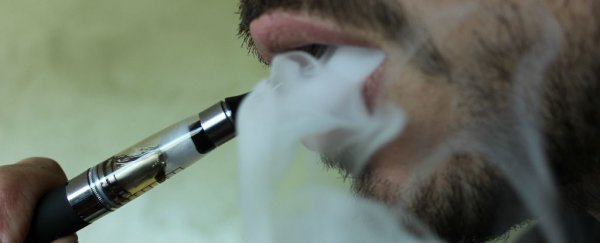The 'wild west' of e-cigarettes, where nothing was regulated and the scientific opinion was inconclusive at best, has come to an abrupt end, with the US Food and Drug Administration (FDA) announcing over the weekend that it will now start regulating e-cigarette products, requiring age limits, clearer product labels, and health warnings going forward.
The move, which seemed inevitable to many, given how pervasive vaping has become in the US, will force manufacturers to submit their products for FDA approval, where their ingredients, safety and emissions data, and manufacturing processes will now be scrutinised for the first time since e-cigarettes hit the market.
"The actions being taken today will help the FDA prevent misleading claims by tobacco product manufacturers, evaluate the ingredients of tobacco products and how they are made, as well as communicate their potential risks," the FDA said in a press release.
The FDA said limiting access to minors was of particular importance, with reports showing that e-cigarette use among high school students has risen from 1.5 percent in 2011 to 16 percent in 2015. According to USA Today, federal health officials now estimate that some 3 million middle and high school students are using e-cigarettes.
"Between 2011 and 2015, the percentage of high school students who smoked e-cigarretes has skyrocketed over 900 percent," Health and Human Services Secretary Sylvia Burwell told the press, adding that hookah and cigar use continues to be a problem among teenagers.
The new law, which will see all tobacco and nicotine-containing products regulated under the US Tobacco Control Act, will go into effect in 90 days.
Here are some of the new regulations that now apply to e-cigarettes containing nicotine:
- Not allowing products to be sold to persons under the age of 18 years (both in person and online);
- Requiring age verification by photo ID;
- Not allowing the selling of covered tobacco products in vending machines (unless in an adult-only facility); and
- Not allowing the distribution of free samples.
All manufacturers, importers and retailers of the newly regulated tobacco and nicotine products will now be required to:
- Register manufacturing establishments and providing product listings to the FDA;
- Report ingredients, and harmful and potentially harmful constituents;
- Submit for premarket review and authorisation of new tobacco products by the FDA;
- Place health warnings on product packages and advertisements; and
- No longer sell modified risk tobacco products (including those described as "light", "low", or "mild") unless authorised by the FDA.
You can read the 499-page document here.
"That means nearly every e-cigarette on the market - and every different flavour and nicotine level - would require a separate application for federal approval," Jayne O'Donnell and Laura Ungar report for USA Today. "Each application could cost $1 million or more, says Jeff Stier, an e-cigarette advocate with the National Centre for Public Policy Research and industry officials."
Not surprisingly, the regulations have been met with a whole lot of controversy, and camps on either side are not exactly happy with how the FDA has handled this.
Those who have been calling for tighter restrictions on e-cigerattes for years have criticised the new law for not adequately addressing the use of flavours such as bubblegum, gummy bear, and lemonade, which they say are specifically aimed at young people, Julia Belluz reports for Vox.
They've also voiced concern about the fact that manufacturers will be allowed to continue selling potentially dangerous products for the two to three years that it's expected to take the FDA to assess everything.
On the other side, experts have voiced their concern that regulation could make it harder for smokers to access them as a quit-aid, and could push some manufacturers out of the market altogether.
"Regulators need to watch out for intended consequences of overzealous regulation, such as … making e-cigarettes more expensive and less attractive to smokers; and also avoid conveying a message that e-cigarettes are regulated as strictly [as] or even more strictly than cigarettes because they are as bad," clinical psychologist Peter Hajek from the Queen Mary University of London told Vox.
What e-cigarettes don't exactly have going for them is the fact that research into their health effects is still very much in its infancy - 10 years after they first hit the market, we're not much closer to understanding just how harmful or harmless the cocktail of chemicals in e-cigerette liquid actually is, particularly with long-term use.
While heavy regulations will force the issue when it comes to getting a whole lot more scientific data on e-cigarette contents than ever before - a good thing in the long run - let's hope it doesn't come at the cost of what's been the only thing that's helped many cigarette smokers quit for good.
